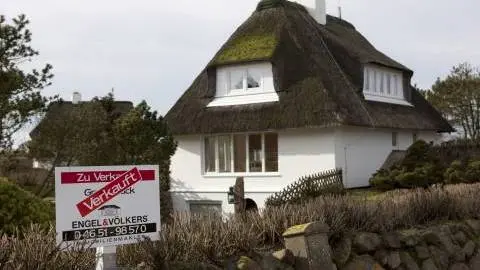Belgium: house price growth to moderate after strong run
We expect house price growth to moderate and think prices will rise by around 4% in 2022 as higher inflation and tighter monetary policy put upward pressure on mortgage rates. But as Belgians overall have a firm belief in the stability of the housing market, the probability of a strong price correction is limited
Belgium's market structure: owner-occupied
Home ownership in Belgium sits at more than 70%, while about 20% of households rent at market prices and just under 10% rent at reduced prices. This situation is quite stable and has been the case for at least 20 years.
The rental market is mainly occupied by private and small investors. In recent years, however, it seems that larger private investors and institutional investors have been gaining more traction.
A strong market during the pandemic
Activity in the housing market recovered fast after the first lockdown in 2020 and the number of transactions in the first three quarters of 2021 was higher than in the three previous years (data for the fourth quarter are not yet published). The strong activity applied to all segments (houses, detached properties and apartments) and all regions (Flanders, Wallonia, and Brussels Capital Region).
Price growth was strong and accelerated during the pandemic. In 2020, Eurostat recorded a 4.2% increase in house prices and in 2021 we expect about 7% growth (data for the fourth quarter are not yet published). Even though price growth accelerated and was strong in Belgium during the last two years, it is in line with the eurozone average.
Macroeconomic factors, such as lower interest rates and income support during the pandemic can partly explain the strong growth figures. We also note that the preferences of Belgians seem to have changed in the last two years. An ING survey shows that Belgians find having a larger home (both indoors and outdoors) more important today than before the pandemic. The same holds true for the quality of the home, including energy efficiency. As people find a home more important, it is normal that they also want to pay more for it.
Additionally, the so-called FOMO effect (Fear Of Missing Out) probably also played a role in the strong price growth. As Belgians saw prices grow quickly, they may have wanted to act fast or risk paying even higher prices in the future. This mechanism also puts upward pressure on prices.
Overvaluation rose
According to the National Bank of Belgium, the overvaluation of residential real estate increased from 14% in 2020 to 21% in 2021. This is the second increase in a row. In 2020, the overvaluation doubled compared to 2019. The National Bank of Belgium already has a number of macroprudential policies in place to cool down the market, including limits on loan-to-value ratios for banks. We acknowledge the increased risk but also feel that the house price overvaluation is nuanced. Due to the change in preferences, the willingness to pay has gone up. However, the model of the National Bank of Belgium doesn't capture this change in preferences and perceives the corresponding price increases as a simple overvaluation. The National Bank also acknowledges that the growing scarcity of building plots might be a reason not to take the overvaluation estimate at face value. Residential real estate prices might be on the expensive side, but probably not overvalued by 21%.
Outlook: House price growth will moderate
We expect house price growth to moderate and think prices will rise by around 4% in 2022.
Higher inflation and tighter monetary policy will put upward pressure on mortgage rates. The war in Ukraine could also lead to an increase in the risk premium set by banks. Note that a 1% increase in the mortgage rate lowers the borrowing capacity by about 9% (for a fixed-rate annuity mortgage with a maturity of 20 years). Since the beginning of the year, the average mortgage rate has already gone up by more than 50 basis points, implying 4.5% less borrowing capacity.
So higher mortgage rates put downward pressure on prices but we still think prices will grow. Indeed, we continue to expect the Belgian economy to grow in 2022, even though the war in Ukraine has reduced our growth forecast. We currently expect that the economy will grow by 2.5% in 2022, which should support income growth. On top of that, the system of automatic wage indexation protects wages from inflation.
In Flanders, there was also an adjustment to the system of registration rights. People who buy a home to live in themselves now face a 3% registration tax instead of 6%. People who buy a second home or another home to rent out now face a 12% tax instead of 10%. As such, regulation for investors seems to be getting slightly more restrictive.
In the medium term, the number of households is forecast to increase in the next decade, which should support demand and to some extent, prices. Belgians overall have a firm belief in the stability of the housing market, which in general reduces the chances of a strong price correction. Even during the financial crisis, when house prices crashed in several European countries, Belgian house prices only saw a minor correction.
This publication has been prepared by ING solely for information purposes irrespective of a particular user's means, financial situation or investment objectives. The information does not constitute investment recommendation, and nor is it investment, legal or tax advice or an offer or solicitation to purchase or sell any financial instrument. Read more
Download
Download article
31 March 2022
Europe’s housing market looks set to cool This bundle contains 4 Articles